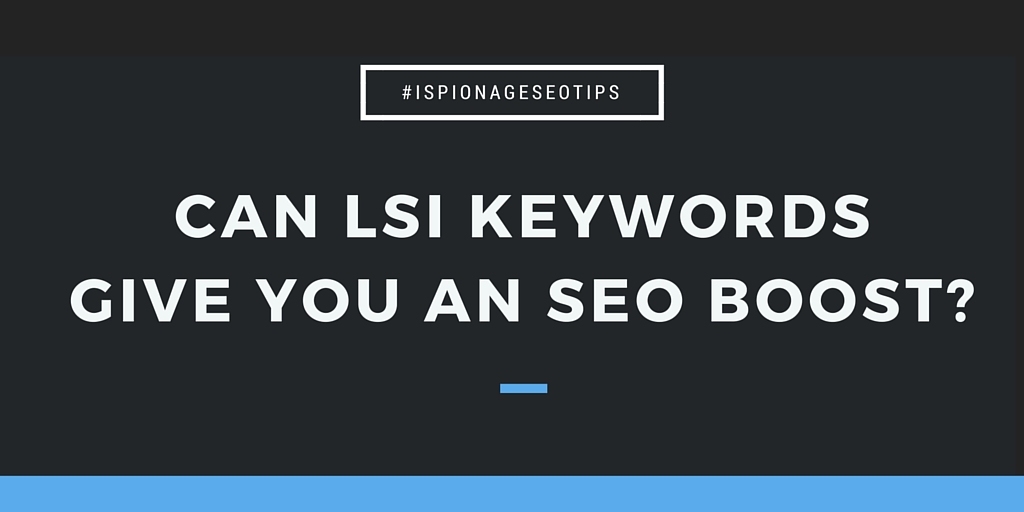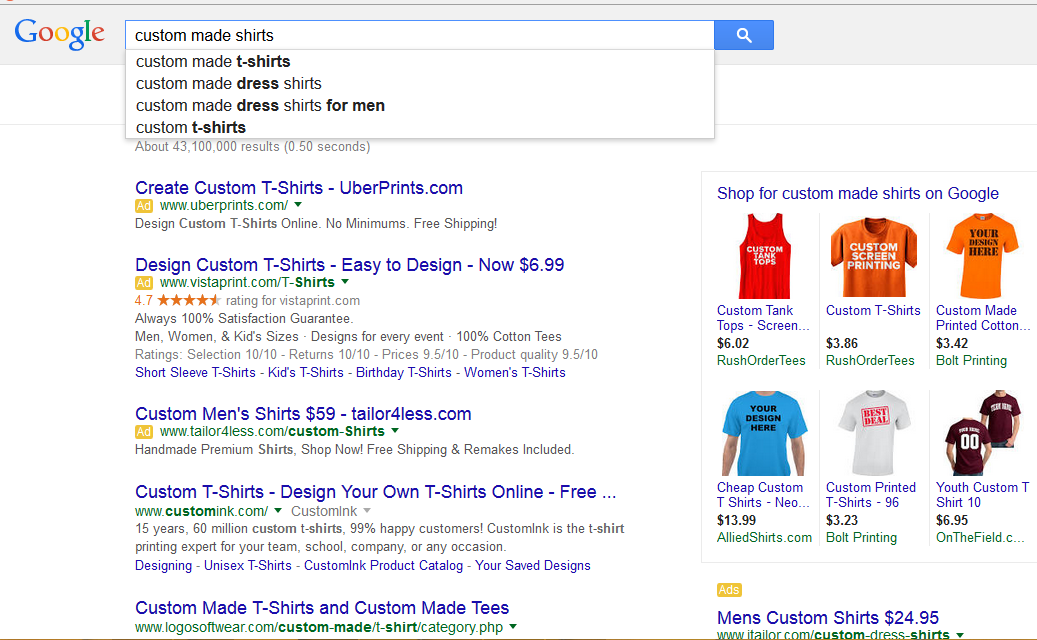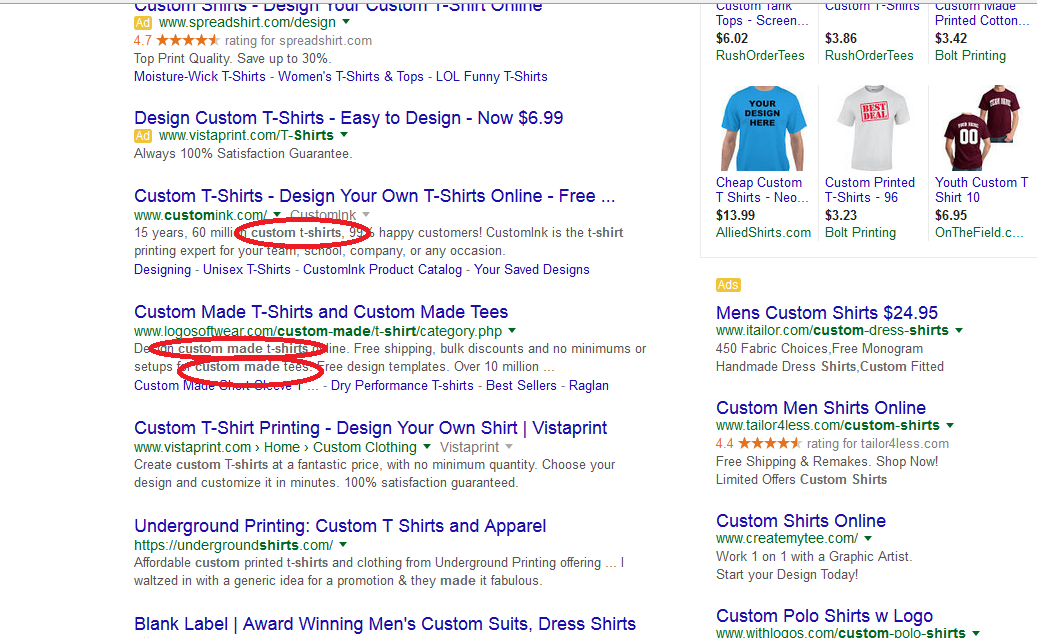
I’m constantly searching for new SEO techniques to help improve my page ranking.
One of the best strategies I’ve found has evolved around the use of LSI keywords. By using LSI keywords, I’ve been able to resurrect dead content and climb to the top of search results with fresh content.
So What Is an LSI Keyword?
LSI is an acronym for Latent Semantic Indexing. Without getting into the science and the mathematical model behind it, I can tell you it’s the way Google and other search engines look for relationships between various terms and concepts.
How It Works
When you Google a term, in this case we’ll use “custom made shirts” as an example, Google will return relevant results for that keyword or phrase. However, it will also return pages that are relevant to words similar to that term. These relevant, related words are known as LSI keywords.
Let’s take a look at the example. When we Google the term “custom made shirts,” you’ll see auto fill words that are related to the keyword you’re searching for. These are all part of LSI. Google is showing you keyword terms that are related to what you’re searching for (as seen below).

Why would Google do this? It’s simple. Google wants to return the most relevant content to its users. If it only relied on the “exact” term you’re searching for, the results would be full of spam pages with stuffed keywords. That’s why Google Hummingbird is now in place to help weed out keyword stuffed content and return only quality results.
Here’s How Google Displays LSI Keywords
If you look at the results that return for “custom made shirts,” you’ll see various words highlighted in the description of each web page. These are the LSI keywords and are phrases that Google’s algorithm have determined are related to the original search phrase.

For our search term, Google returned “custom t-shirts,” “custom made t-shirts,” and “custom made tees” as a few LSI keywords.
This is why having a good meta description is valuable. Not only should you use your keyword in the description, but also supplement the description with at least one LSI keyword phrase in order to get more love from Google.
Now That You Know What LSI Keywords Are, How Do You Use Them?
First, I need to tell you that you must continue to use your main keyword. Eliminating your primary keyword will be harmful and LSI keywords are only to be used as a supplement.
I recommend using at least two LSI keyword phrases within your content in addition to your main keyword. Use each no more than two times in the content (I use them only once).
If you’re trying to recover from a Google penalty or are looking to avoid a Google penalty, then LSI is a great way to fix your keyword stuffed content. Simply rewrite the content and use LSI keywords as opposed to the keyword phrase that you initially used to stuff the article like a Thanksgiving turkey.
How Do you Find the Best LSI Keywords?
Google shows you the LSI keywords as you saw above when you conduct a search. Simply use Google to search a keyword and then look at what Google highlights in the description of the results. This will give you a good list of LSI keywords to use.
If you want a surefire way to find the best LSI keywords, there is software out there that will help. Plenty of online tools are available for a fee and can help you isolate the best LSI keywords to supplement your main keyword phrase.
Another great way is to use Google Adwords to see which related phrases your terms show up for or have your PPC agency locate them for you. If your provider is good, they’ll already be implementing LSI keywords as part of your PPC campaigns.
Here’s How I Used LSI to Revive Dead Content
First, I looked for pages that were dead and not receiving a lot of traffic. Once I found them, I simply supplemented the keyword phrase with LSI keywords. It took my keyword density down, but it also increased my chances of Google picking up the content for the new keywords. So while the content contained five to six of the same keyword phrases, each article went to having approximately three of my main keyword phrases and then one each of the LSI keyword phrases I chose to use.
Within a few weeks, page views actually increased for the content. The increase was not huge, but it was enough for me to know that it was not a coincidence. It also convinced me that LSI keywords should be used for all my content.
When I began using LSI keywords in new content that was posted, I was able to see an immediate impact. Content ranked faster and page views were better than any content I wrote in previous years.
Here Are Some Other Ways LSI Keywords Can Help with SEO
Here are a few other ways you can use LSI keywords to help with SEO.
- PPC Campaigns: If you’re looking for a good batch of keywords for your PPC campaigns, don’t just use primary variations of your keyword. Sprinkle in LSI keywords to strengthen when and how your ads appear.
- Meta descriptions: As stated above, LSI keywords are displayed in the meta descriptions in the search results. Use them in your meta data to help Google know what your content is about.
- Google penalty reduction: You can reduce your chances of being penalized by Google by reducing your keyword use and supplementing with LSI keywords. It makes your content look more natural to Google and feel more natural to the reader. Avoiding penalties keeps your site indexed which is the only way you will be found in search.
- Content quality: By reducing the number of times you use the same phrase over and over in your content, you’ll increase the readability of your article which in turn leads to longer page views, a ranking signal to Google.
- Image optimization: Do you have an image that you have used more than once on your site? Well, simply use LSI keywords to rename the image each time you use it. This will help optimize it for each piece of content you write.
Author
Michael Wood is an online marketing expert and owner of Legalmorning.com. He specializes in reputation and brand management, article writing, and professional Wikipedia editing. He is an expert Wikipedia editor and has helped hundreds of businesses and people post their articles to the site where they have otherwise failed.







